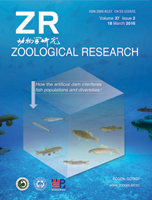
|
Zoological Research
Kunming Institute of Zoology, Chinese Academy of Sciences
ISSN: 2095-8137
Vol. 28, No. 6, 2007, pp. 659-663
|
 Bioline Code: zr07098
Bioline Code: zr07098
Full paper language: Chinese
Document type: Research Article
Document available free of charge
|
|
|
Zoological Research, Vol. 28, No. 6, 2007, pp. 659-663
| en |
Unfolding of Population Structure in Dehong Buffalo Using Microsatellite DNA Markers
YANG, Ze-yu; MIAO, Yong-wang; LI, Da-lin; HUO, Jin-long; CHEN, Tao; HE, Chao-yang; CHUANG, Xiang-hui & TANG, Shou-kun
Abstract
Dehong buffalo are an indigenous buffalo breed in Yunnan province, China. A total of 81 unrelated samples from Dehong buffalo breeds were genotyped using 15 microsatellite DNA markers from 14 chromosomes to estimate genetic diversity, genetic differentiation and gene flow within populations. A total of 62 alleles were detected across the 15 loci assayed. All the loci were polymorphic and the number of alleles ranged from two to six, giving a mean number of 4.13 alleles per locus. The expected heterozygosity and polymorphism information content of 15 microsatellite loci were 0.6520±0.1526 and 0.5863±0.1789, respectively. Coefficients of genetic differentiation ranged from 0 to 0.0919, with the average of 0.0202. Gene flow at each locus was large, with a mean Nm of 12.1502. The results indicated that the genetic diversity was rich among Dehong buffalo and the genetic differentiation in its sub-populations was relatively low, with larger gene flow and less inbreeding.
Keywords
Dehong buffalo; Microsatellite DNA; Genetic variation; Genetic differentiation; Gene flow
|
| |
© Copyright 2007 Kunming Institute of Zoology, the Chinese Academy of Sciences
Alternative site location: http://www.zoores.ac.cn/
|
|
